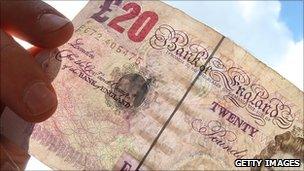Personal debts: Do not delay, act today
- Published

Total personal debt in the UK, including mortgages, still stands at nearly £1.5 trillion
There are an estimated 961,000 individuals in the UK struggling with debt, according to R3, the Association of Business Recovery professionals,
The current environment means this is unlikely to change.
The boom years saw cheap credit become widely available and enabled many people to enjoy things they would not necessarily have had the chance to.
Whilst on one level this was a great opportunity, it did mean some individuals were living beyond their means, without being able to potentially meet its true costs.
In one case I saw, a mid-30s lady working part-time with an annual income of just over £12,000 had run up credit card debts of nearly £90,000.
The expenditure was caused by living beyond her means, restaurants, socialising etc.
But the sad thing about this case was there was absolutely no prospect of her ever repaying this debt and she had no option but to go bankrupt.
Count the pennies
There are numerous warning signs.
Amongst them are having to borrow from Peter to pay Paul, paying for bills on your credit cards, regularly exceeding or extending your overdraft limit, or incurring charges for direct debits and standing orders that are not being met.
As soon as you start to see any of these, seek help and take steps before it is too late.
A good exercise to do is to write down all your expenditure in a month, down to the last penny.
Very often people carrying excessive debt bury their heads in the sand and try and ignore it.
By writing it all down the clear reality cannot be ignored and it is really quite amazing how our monthly expenditure is often much higher than we think it is.
Where to go?
The most important thing when dealing with debt is to get good clear advice as soon as you can.
A professional perspective on your situation may help you see it from a whole different viewpoint and give you the confidence to actually deal with the matter, rather than ignore it.
There is a lot of help and advice available to those in debt.
The Citizens Advice Bureau, for example, offers an excellent service and there are many licensed insolvency practitioners who will give an hour's free advice.
The important thing to remember is that you are not alone - there are options and people available to help.
The key thing to do is to act early.
Procedures
Whilst there are many options for sorting out debts, there are two major differences that people must be aware of between a formal insolvency process and a debt management arrangement.
A bankruptcy or individual voluntary arrangement (IVA) lasts typically between one and five years and at the end, any balance of unpaid debt outstanding is written off.
A debt management arrangement lasts a great deal longer, however, and there is no guarantee that any part of the debt will be written off.
People must realise that these are informal plans that can be changed by the creditor at any time and this can include an increase in the amount of the monthly payments.
These informal arrangements are only a way of delaying dealing with debt and do not tackle the core issue.
Debt 'management'
Of course, with remortgage options now largely unavailable, many people are turning to these debt management arrangements as a way of providing short-term relief.
However, that does not deal with the main issue, which is debt repayment and debt forgiveness.
The average age of someone filing for bankruptcy in the UK is falling.
In 2005 it was 41, now it is estimated to be 38.
Simply, this means that if someone has entered into a debt management arrangement, they may not come out of it until they are nearing 50 and then may still have debt to repay.
My concern is that if debt is not dealt with now, we are in danger of finding ourselves faced with a large proportion of the population who have not had time to rebuild their financial future, and thus will not able to provide for their old age.
'Saving grace'
Debt Relief Orders (DROs) are an option suitable in specific circumstances.
They came into being in 2009 and are there to assist those individuals who have debts of £15,000 or less.
To qualify for a DRO, someone must not have total gross property worth more than £300; a motor vehicle worth more than £1,000; and disposable income of more than £50 per month.
There are also the options of individual voluntary arrangements and bankruptcy, neither of which carry the stigma they once did.
It is time to start repaying the debts incurred and begin living within our means.
Whatever option is right for you, I would urge anyone struggling with debt to deal with it now.
Do not leave it until it is too late to rebuild your financial future - early action will prove a saving grace.
The opinions expressed are those of the author and are not held by the BBC unless specifically stated. The material is for general information only and does not constitute investment, tax, legal or other form of advice. You should not rely on this information to make (or refrain from making) any decisions. Links to external sites are for information only and do not constitute endorsement. Always obtain independent, professional advice for your own particular situation.